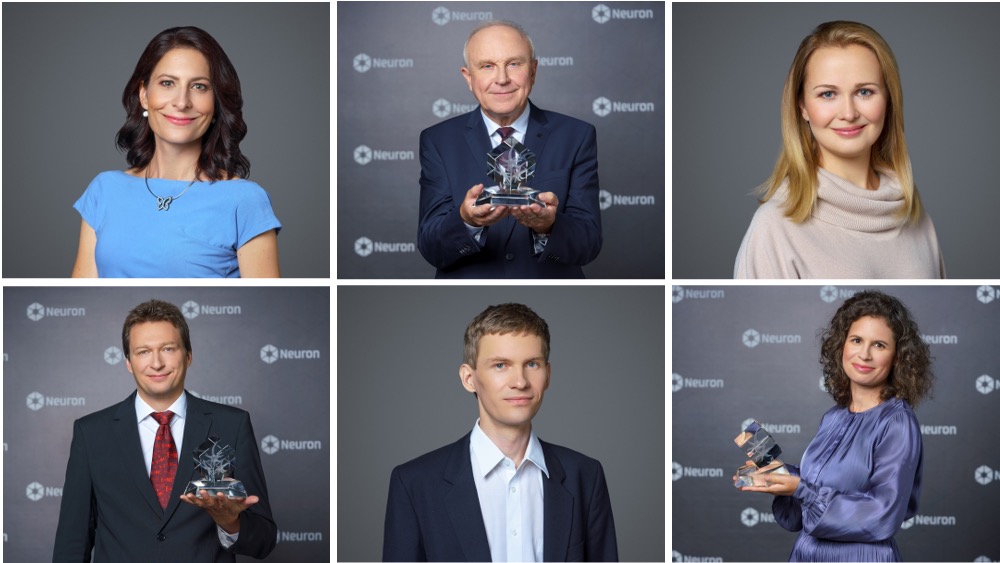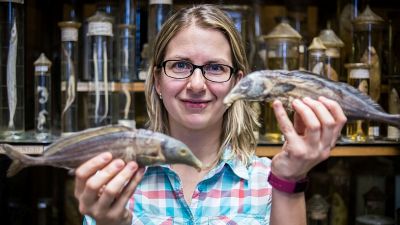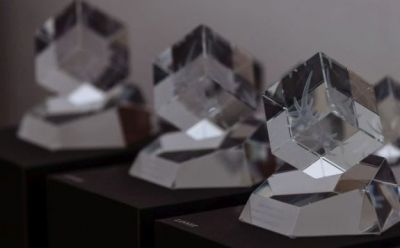Two Czech scientists who have contributed significantly to global research with their lifetime of work, one scientific transfer project and six young scientific talents. These are this year's awards from the Neuron Foundation for Science. Six of the nine awards have gone to Charles University. The main award went to Professor Jan Starý, a doyen of paediatric haematology and oncology from the Second Faculty of Medicine of Charles University. The second major prize for contribution to world science went to Professor Pavel Hobza, a chemist associated with the Institute of Organic Chemistry and Biochemistry of the Czech Academy of Sciences.

Awarded CU personalities: (top row) Martina ŽIvná, Jan Starý, Marya Shamzhy, (bottom row) Martin Setvín, Jan Kynčl and Anežka Kuzmičová.
The Neuron Award for lifetime contribution to science in the field of medicine was presented on Sunday 16 October to:
• Jan Starý from the Second Faculty of Medicine of Charles University
(a pioneer of innovative treatment of childhood leukaemia and bone marrow transplantation)
Professor Jan Starý is an internationally renowned paediatric haematologist and oncologist. In the 1980s, children with leukaemia were treated according to Western European protocols, which increased their survival rate to more than 90 percent today! In the next decade, Professor Starý connected all haemato-oncology centres in the Czech Republic, introduced new treatment approaches and influenced the European approach to treatment.
“I belong to the lucky generation of doctors who have experienced incredible progress in their field, which they could not even imagine at the beginning. When I started, almost all children died of leukaemia; today almost all survive. I consider this very fortunate, because not every doctor has this happen to him,” said Professor Starý, emeritus head of the Department of Paediatric Haematology and Oncology at Motol University Hospital and a teacher of several generations of his followers, in a past interview for Forum magazine. For his outstanding scientific and medical activities, he was awarded, among other things, the prestigious Donatio Universatis Carolinae research grant.
The Neuron Awards for Promising Scientists for 2022 were awarded to:
 • Martina Živná from the First Faculty of Medicine of Charles University
• Martina Živná from the First Faculty of Medicine of Charles University
(in medicine for finding causes of hereditary kidney disease)
She has been involved in the identification of genes whose mutations lead to the development of hereditary chronic kidney failure (ADTKD). She has made a significant contribution not only to the elucidation of the mechanism of the disease, but also to the development of diagnostic methods. This has enabled the correct and early identification of the disease in patients from more than a thousand families worldwide. She is involved in the development of treatment for ADTKD. Martina Živná works in the Laboratory for Rare Diseases Research at the Department of Paediatrics and Inherited Metabolic Disorders at the First Faculty of Medicine, Charles University in Prague. Her work to date promises further significant discoveries in the field of inherited kidney diseases.
 • Anežka Kuzmičová from the Faculty of Arts, Charles University
• Anežka Kuzmičová from the Faculty of Arts, Charles University
(in social sciences for literacy research)
Anežka Kuzmičová is a pioneer in the discipline, which represents a new approach to literacy research in children and adults. A graduate of Charles University and Stockholm University, she now leads the interdisciplinary research group Integral Research on Text and Reading at the Faculty of Arts of Charles University. Kuzmich's work is based on the premise that reading skills and experiences are a layered interplay of linguistic, technological, physical, personal and cultural aspects and are influenced by social evaluation. "We focus on children's experience holistically - how children think about stories or whether they want to talk about it afterwards and share the experience," she told Forum. Such an interconnection of disciplines as seen in her work is not common in the humanities; her approach in combining methods is unique in the Czech and international context. Kuzmičová was also a guest on the CU podcast Forum Radio with Jan Velinger earlier in 2022, where she spoke extensively about her and her team’s approach and how they had to adapt during the Covid pandemic.
 • Martin Setvín from the Faculty of Mathematics and Physics of Charles University
• Martin Setvín from the Faculty of Mathematics and Physics of Charles University
(in physics for research on non-conductive materials)
In his research his aim is to find out why some materials generate photovoltage and how the energy can be used. Possible applications range from electronics to fuels. Associate Professor Setvin is a surface physicist who has perfected scanning probe microscopy - obtaining previously unseen atomic resolution images on non-conductive materials. In his group at the Faculty of Mathematics and Physics at Charles University, he continues to seek their practical application. Martin Setvín is one of the most respected names in Czech physics, as evidenced by his publications in the prestigious scientific journals Nature and Science.
 • Mariya Shamzhy from the Faculty of Science of Charles University
• Mariya Shamzhy from the Faculty of Science of Charles University
(in chemistry for research on porous materials)
Mariya Shamzhy is tackling one of the long-standing key challenges for materials scientists - understanding how heterogeneous catalysts facilitate chemical reactions, and at the atomic level. She focuses on the synthesis of new types of zeolites, their characterization and the explanation of their catalytic properties. The results so far promise new concepts for inorganic chemistry and/or chemical engineering. Mariya Shamzhy graduated from Lomonosov University and received her Ph. D. from the Ukrainian Academy of Sciences. Today, she works at the Faculty of Science of Charles University, where she leads her own group.
• Jan Kynčl from the Faculty of Mathematics and Physics of Charles University
Jan Kynčl from the Faculty of Mathematics and Physics of Charles University
(in mathematics for his breakthroughs in combinatorics)
Jan Kynčl is a leading expert in combinatorics and discrete geometry, in which he has made fundamental discoveries. He works at the Faculty of Mathematics and Physics of Charles University. He has improved algorithms for drawing abstract topological graphs or obtained new estimates for the intersection number of a graph. Both are related, for example, to the clear display of diagrams with many intersections, such as diagrams of airline connections between cities or biological or social networks. With other co-authors, he obtained a superlinear estimate for the number of empty convex pentagons in point sets, a bound that had resisted for thirty years. He also achieved several important results on the structure of permutations that advanced the field!
Other prizes for basic and applied research
The Neuron Award for Lifetime Contribution to Science in Chemistry was awarded to Professor Pavel Hobza of the Institute of Organic Chemistry, Academy of Sciences of the Czech Republic - one of the world's most influential scientists in computational chemistry and discoverer of a new type of hydrogen bonding that helps explain the structure of biomolecules.
The Neuron Prize for connecting science and business goes to Pinflow energy storage, a company dedicated to storing energy in redox flow batteries. The scientific know-how comes from a collaboration between the University of Chemical Technology in Prague and the University of West Bohemia in Pilsen, which resulted in the establishment of a commercial entity.
The Neuron Prize for promising scientists in the field of biology was also awarded to Gabriel Demo from Masaryk University and the CEITEC research centre for his research on transcription and translation communication. He is interested in protein structures and is interested in RNA and protein synthesis - how the processes of transcription and translation interact and how they transfer genetic information.


















